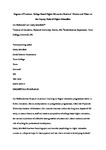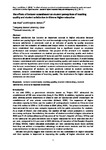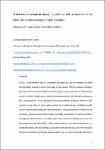STUDENT VOICES AND STUDENT CHOICES: NARRATIVE ACCOUNTS OF DIFFERENTIATED HIGHER EDUCATION EXPERIENCES OF FIRST IN FAMILY HE STUDENTS
| dc.contributor.supervisor | Hohmann, Ulrike | |
| dc.contributor.author | Brown, Philip | |
| dc.contributor.other | Plymouth Institute of Education | en_US |
| dc.date.accessioned | 2019-08-14T16:30:56Z | |
| dc.date.issued | 2019 | |
| dc.identifier | 10382763 | en_US |
| dc.identifier.uri | http://hdl.handle.net/10026.1/14797 | |
| dc.description.abstract |
This thesis considers the HE choices and experiences of First in Family (FiF) HE students studying in a Sixth Form College (SFC), a FE College (FEC), and a small ‘teaching-intensive’ university. Using Bourdieusian sociological analysis it explored the complex influences upon students’ HE choices and the impact of the institutional environment upon student experiences. The implications of the study are considered in terms of policy and practice for students, institutions, and government. Neoliberalism and social inclusion policies have created a complex, competitive, and fragmented field of HE providers and qualifications. In exploring this field, previous research has predominantly used social class to compare choices and experiences of working-class and middle-class students across prestigious and non-prestigious HEIs. Little research is focussed exclusively on FiF students, and that which does tend to focus on HE access, or a specific aspect, rather than taking a longer-term holistic view of the student experience. Research on College HE (CHE) highlights some of the challenges for these institutions and students, yet there is little comparative research across non-traditional providers, or that which compares CHE to universities. This study contributes to understanding these gaps. The qualitative study draws on the empirical experiences of 15 FiF students, five students from each of the three settings. The longitudinal study followed students over two academic years and two narrative interviews explored students’ HE choices and experiences. Bourdieu’s conceptual tools provide the primary analytical lens to consider macro-political and economic influences on HE, meso level analysis of the HE field and its institutions, and the impact of these upon students. Habitus and capitals strongly influenced HE choice, the FiF students were positioned at the margins of the HE field which influenced their decisions to select non-traditional institutions. CHE students applied for a single course offered by a familiar CHE provider and university students’ choices were idiosyncratic, rather than strategic. The findings challenge policy rhetoric that students behave as ‘informed consumers’ when provided with sufficient course and employment data. The institutions significantly shaped doxic expectations and students’ illusio was drawn to the social and cultural capitals they most valued across the academic, employment, and social domains of their HE experiences. Residential university students had transformational experiences and most valued the social and academic domains of ‘the full university experience’. This came at the cost of investment in specific career orientated activity. There was limited social engagement beyond taught classes in CHE environments. Young students in the FEC and SFC were instrumental and adopted ‘part-time’ approaches to study focused upon the outcome of their graduate status, rather than on the experience. CHE students felt constrained by institutional culture and practices and were ambivalent about the quality of their overall HE experience. Some students utilised the opportunities presented through condensed course delivery in CHE to connect part-time work to future career aspirations. Mature students had transformational experiences in academic and career confidence and new aspirations for their children in HE. | en_US |
| dc.language.iso | en | |
| dc.publisher | University of Plymouth | |
| dc.subject | Higher Education Student Experiences | en_US |
| dc.subject | Higher Education Student Choices | en_US |
| dc.subject | Bourdieu | en_US |
| dc.subject | Further Education College Higher Education | en_US |
| dc.subject | First Generation Higher Education | en_US |
| dc.subject | First in Family | en_US |
| dc.subject | Higher Education Policy | en_US |
| dc.subject | Widening Participation | en_US |
| dc.subject | Higher Education | en_US |
| dc.subject | Narrative inquiry | en_US |
| dc.subject | Student experience | en_US |
| dc.subject | Student choice | en_US |
| dc.subject | University | en_US |
| dc.subject | Degree | en_US |
| dc.subject | Foundation Degree | en_US |
| dc.subject | Tuition Fees | en_US |
| dc.subject | Mature Students | en_US |
| dc.subject.classification | Other (e.g., MD, EdD, DBA, DClinPsy) | en_US |
| dc.title | STUDENT VOICES AND STUDENT CHOICES: NARRATIVE ACCOUNTS OF DIFFERENTIATED HIGHER EDUCATION EXPERIENCES OF FIRST IN FAMILY HE STUDENTS | en_US |
| dc.type | Thesis | |
| plymouth.version | publishable | en_US |
| dc.identifier.doi | http://dx.doi.org/10.24382/982 | |
| dc.identifier.doi | http://dx.doi.org/10.24382/982 | |
| dc.rights.embargodate | 2020-08-14T16:30:56Z | |
| dc.rights.embargoperiod | 12 months | en_US |
| dc.type.qualification | Doctorate | en_US |
| rioxxterms.version | NA | |
| plymouth.orcid.id | https://orcid.org/0000-0002-4083-7038 | en_US |
Files in this item
This item appears in the following Collection(s)
-
01 Research Theses Main Collection
Research Theses Main





